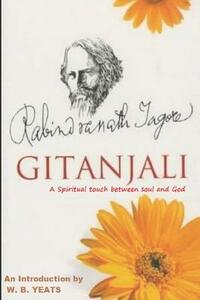Take a photo of a barcode or cover
138 reviews for:
The Gitanjali (English): The Nobel prize Winner Book for Literature
Rabindranath Tagore
138 reviews for:
The Gitanjali (English): The Nobel prize Winner Book for Literature
Rabindranath Tagore
emotional
inspiring
reflective
medium-paced
Tagore writes nicely of creation, and beautifully of death. I'm sure much is lost in the translation from the original language, though.
This was my first time to come across poetry like this which was so deep and so meaningful. I loved them so much. And keeping few of them for myself for ever.
Originally on Hina Loves To Read
I would just say it makes me wish I knew Bengali to get the real feels of these all.
I would just say it makes me wish I knew Bengali to get the real feels of these all.
There are books which you read once. There are those which you revisit from time to time. Then there are those which you want to read again and again, for its contents cut to the core of your being, and each rereading reveals a new layer, of it and yourself.
Gitanjali, to me to one such work, ranked among the likes of [b:Siddhartha|52036|Siddhartha|Hermann Hesse|https://i.gr-assets.com/images/S/compressed.photo.goodreads.com/books/1629378189l/52036._SY75_.jpg|4840290] by Herman Hesse and Victor Frankl's [b:Man's Search for Meaning|4069|Man's Search for Meaning|Viktor E. Frankl|https://i.gr-assets.com/images/S/compressed.photo.goodreads.com/books/1535419394l/4069._SY75_.jpg|3389674].
I'm told that the original Bengali rendition is much more melodious and soulful, but being a novice in said language, I have to content with this.
The 100 odd poems which make up the book, delve into the concept of Bhakti, Vairāgya and devotion to Prakriti. The author Tagore, tries to realize the concept of Maya, wherein all we have and earned in this world are but transient pleasures. Only discarding them and being unaffected by the Maya of the material world can we attain unity with the supreme consciousness of Brahman.
Much of the verses deal with the sense of longing that a devotee feels longing for the presence of their lord, and sections deal with concepts such as devotion, love, dispassionate worship and the eventuality of death.
A work which needs to be explored in much depth for one's spiritual journey. A must read.
Edit 28Jul2022: On the fifth or so rereading I've come to gain great appreciation and adoration for Gurudev's words and sincerity celebration of life, death, God and nature.
Edit 07Oct2022: Much akin to Vivaldi's Four Seasons, Tagore's poems make the allegory of different parts of the days & seasons, and make them reflect the mind of the devotee, or the seeker of truth. From the Spring of happiness & new beginnings, the summer of drought & solitude, the dark monsoon pregnant with troubling thoughts, the twilight autumn which heralds the coming of the cold dead winter of finality.
__________
Verse 100: I dive down into the depths of the ocean of forms,
hoping to gain the perfect pearl of the formless.
No more sailing from harbor to harbor with this my weather beaten boat.
The days are long passed when my sport was to be tossed on waves.
And now I'm eager to die into the deathless.
Into the audience hall by the fathomless abyss where swells up the music of tone less strings I shall take this harp of my life.
I shall tune it to the notes of forever, and when it has sobbed out and when it has sobbed out its last utterance, lay down my silent harp at the feet of the silent.
Verse 55: Languor is upon your heart and the slumber is still on your eyes.
Has not the word come to you that the flower is reigning in splendor among thorns?
Wake, oh awaken! Let not the time pass in vain!
At the end of the stony path, in the country of virgin solitude my friend is sitting all alone.
Deceive him not. Wake, oh awaken!
What if the sky pants and trembles with the heat of the midday sun -
what if the burning sand spreads its mantle of thirst -
Is there no joy in the deep of your heart?
At every footfall of yours, will not the harp of the road break out in sweet music of pain?
Gitanjali, to me to one such work, ranked among the likes of [b:Siddhartha|52036|Siddhartha|Hermann Hesse|https://i.gr-assets.com/images/S/compressed.photo.goodreads.com/books/1629378189l/52036._SY75_.jpg|4840290] by Herman Hesse and Victor Frankl's [b:Man's Search for Meaning|4069|Man's Search for Meaning|Viktor E. Frankl|https://i.gr-assets.com/images/S/compressed.photo.goodreads.com/books/1535419394l/4069._SY75_.jpg|3389674].
I'm told that the original Bengali rendition is much more melodious and soulful, but being a novice in said language, I have to content with this.
The 100 odd poems which make up the book, delve into the concept of Bhakti, Vairāgya and devotion to Prakriti. The author Tagore, tries to realize the concept of Maya, wherein all we have and earned in this world are but transient pleasures. Only discarding them and being unaffected by the Maya of the material world can we attain unity with the supreme consciousness of Brahman.
Much of the verses deal with the sense of longing that a devotee feels longing for the presence of their lord, and sections deal with concepts such as devotion, love, dispassionate worship and the eventuality of death.
A work which needs to be explored in much depth for one's spiritual journey. A must read.
Edit 28Jul2022: On the fifth or so rereading I've come to gain great appreciation and adoration for Gurudev's words and sincerity celebration of life, death, God and nature.
Edit 07Oct2022: Much akin to Vivaldi's Four Seasons, Tagore's poems make the allegory of different parts of the days & seasons, and make them reflect the mind of the devotee, or the seeker of truth. From the Spring of happiness & new beginnings, the summer of drought & solitude, the dark monsoon pregnant with troubling thoughts, the twilight autumn which heralds the coming of the cold dead winter of finality.
__________
Verse 100: I dive down into the depths of the ocean of forms,
hoping to gain the perfect pearl of the formless.
No more sailing from harbor to harbor with this my weather beaten boat.
The days are long passed when my sport was to be tossed on waves.
And now I'm eager to die into the deathless.
Into the audience hall by the fathomless abyss where swells up the music of tone less strings I shall take this harp of my life.
I shall tune it to the notes of forever, and when it has sobbed out and when it has sobbed out its last utterance, lay down my silent harp at the feet of the silent.
Verse 55: Languor is upon your heart and the slumber is still on your eyes.
Has not the word come to you that the flower is reigning in splendor among thorns?
Wake, oh awaken! Let not the time pass in vain!
At the end of the stony path, in the country of virgin solitude my friend is sitting all alone.
Deceive him not. Wake, oh awaken!
What if the sky pants and trembles with the heat of the midday sun -
what if the burning sand spreads its mantle of thirst -
Is there no joy in the deep of your heart?
At every footfall of yours, will not the harp of the road break out in sweet music of pain?
challenging
lighthearted
fast-paced
Plot or Character Driven:
N/A
Strong character development:
N/A
Loveable characters:
N/A
Diverse cast of characters:
N/A
Flaws of characters a main focus:
N/A
The beauty of this work is definitely lost in translation from the original Bengali, as some of the poems were even merged together to create new ones. Gitanjali is a decent lyrical and atmospheric work for English readers who want to get a taste of classical Indian literature.
Early in the day it was whispered that we should sail in a boat, only thou and I, and never a soul in the world would know of this, our pilgrimage to no country and to no end.
In that shoreless ocean, with thy silently listening smile my songs would swell in melodies, free as waves, free from all bondage of words.
Many of the poems blur together and seem like they’re repeating. The poems are centered around the author’s devotion to God. Despite the outdated jargon, the reader can still understand the basic idea of the poems.
Much of the intricacies of language are lost in translation (like I said above), and makes me think about how words sometimes limit our thoughts and emotions. I thought the above quote perfectly encapsulates this restrictive feeling, almost as if the author is addressing this exact concern. Perhaps thats why Gitanjali is supposed to read like a song: transcendent and melodious.
some beautiful, beautiful passages contained here, with lovely illustrations
I enjoyed the first ten or so of these beautiful poems, then they all blended together and became boring. Not to my taste.
challenging
emotional
hopeful
inspiring
relaxing
sad
medium-paced
Plot or Character Driven:
Plot
Strong character development:
N/A
Loveable characters:
N/A
Diverse cast of characters:
N/A
Flaws of characters a main focus:
Complicated
emotional
hopeful
inspiring
mysterious
reflective
medium-paced
Plot or Character Driven:
Character
Strong character development:
N/A
Loveable characters:
Yes
Diverse cast of characters:
N/A
Flaws of characters a main focus:
Yes
First, this is a beautiful collection of poetry, from a place of cultural history where poetry and religion are virtually one and the same. In this light, Bengali poet Tagore's own translation of his poems is a gift for those who cannot read the original.
That said, historically this collection of 103 poems has largely been altered having been published by the India Society of London in 1912. One poem has been merged from two; large portions have been removed or changed. The original Bengali version had over 150 poems. The work nevertheless helped earn Tagore the Nobel Prize in Literature.
Setting aside the historical problems, what is here remains vital, soul-felt, an amazing layering of a single small narrated life atop a larger cosmos and theology, uttered as a long prayer. In so much Western literature, we are able as readers to separate these layers of meaning: this part is literal and this is the allegory. . . Here, however, the verse inseparably binds these layers, and author / speaker / narrated / literal / symbolic are a single organic utterance, frail in spoken voice and volatile in spirit. I wonder, then, how much more potent the original text must be.
English readers must lament that early editions like this one have no accurate capturing of the full Gitanjali (or "Song Offerings") here. Instead we have still a marvel of collected works by Tagore, and so much as possible his own translation. Love it for that.
We are too poor to be late.
And thus it is that time goes by,
while I give it to every querulous man who claims it,
and thine altar is empty of all offerings to the last.
At the end of the day I hasten in fear lest thy gate be shut;
but if I find that yet there is time.
That said, historically this collection of 103 poems has largely been altered having been published by the India Society of London in 1912. One poem has been merged from two; large portions have been removed or changed. The original Bengali version had over 150 poems. The work nevertheless helped earn Tagore the Nobel Prize in Literature.
Setting aside the historical problems, what is here remains vital, soul-felt, an amazing layering of a single small narrated life atop a larger cosmos and theology, uttered as a long prayer. In so much Western literature, we are able as readers to separate these layers of meaning: this part is literal and this is the allegory. . . Here, however, the verse inseparably binds these layers, and author / speaker / narrated / literal / symbolic are a single organic utterance, frail in spoken voice and volatile in spirit. I wonder, then, how much more potent the original text must be.
English readers must lament that early editions like this one have no accurate capturing of the full Gitanjali (or "Song Offerings") here. Instead we have still a marvel of collected works by Tagore, and so much as possible his own translation. Love it for that.
We are too poor to be late.
And thus it is that time goes by,
while I give it to every querulous man who claims it,
and thine altar is empty of all offerings to the last.
At the end of the day I hasten in fear lest thy gate be shut;
but if I find that yet there is time.





